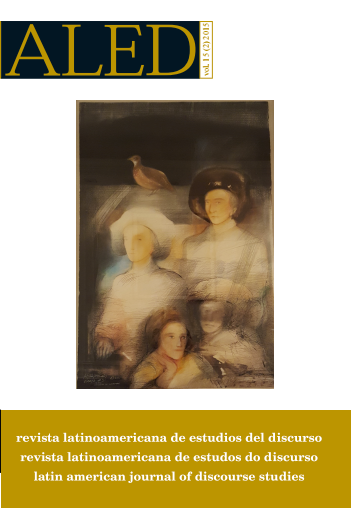Recursos de valoración en comentarios de blogs de ciberperiódicos chilenos
construcción del miedo al cambio social
Keywords:
blogs. appraisal. attitude. fear.Abstract
This article aims to make visible the discursive construction of threat and fear to social change in Chile in a period of structural reforms. For this purpose, we propose an analysis of the linguistic-discursive strategies of appraisal; specifically those pertaining to the semantic domain of attitude (Martin and White 2005) used by participants in blog postings motivated by opinion columns in online newspapers. In this way, our purpose is to provide linguistic evidence of the resistance or naturalization of a state of affairs linked to poverty in every day discourse. In other words, we aim to reveal the evaluations of bloggers and their ideological positioning regarding the social change in a social-political context which demands more participation and transparency to face dominant discourse.
Downloads
References
Bauman, Z. 2007. Miedo líquido. La sociedad contemporánea y sus temores. Barcelona: Paidós.
Christias, P. 2006. Eros político. Comunicación política, imaginario y cambio social. Política y Sociedad 43, 2: 169-176.
Fairclough, N. 2003. Analysing discourse. Textual analysis for social research. London: Routledge.
Fairclough, N. 2010. Critical discourse analysis: The critical study of language. Harlow, U.K: Pearson.
Fairclough, N. y Fairclough, I. 2012. Political discourse analysis: A method for advanced students. New York: Routledge.
Gee, J.P. 2005. La ideología en los discursos. Madrid: Ediciones Morata.
Halliday, M. 1994. An introduction to functional grammar. London: Edward Arnold.
Jackson, G. 2013. El país que soñamos. Santiago: Random House Mondadori.
Kaplan, N. 2007. La teoría de la valoración: un desarrollo de los estudios sobre la evaluación en el lenguaje. En A. Bolívar (ed.). Análisis del discurso ¿Por qué y para qué? pp. 63-86. Caracas: Universidad Central / Los Libros de El Nacional.
Lagrange, H. 1996. La civilité a l’épreuve. Crime et sentiment d’insecurité. Revue Française de Sociologie 37,4: 656-658.
Mancera, A. y Pano, A. 2013. El discurso politico en twitter. Análisis de mensajes que “trinan”. Madrid: Siglo XXI.
Martin, J. y Rose, D. 2007. Working with discourse: meaning beyond the clause. London: Continuum.
Martin, J. R. y White, P. R. R. 2005. The language of evaluation: Appraisal in English. London: Palgrave.
Mayol, A. 2012. El derrumbe del modelo. Santiago: LOM Ediciones.
Mayol, A. 2013. No al lucro. De la crisis del modelo a la nueva era política. Santiago: Random House Mondadori.
Montecino, L. y Arancibia, M. C. 2013. Representaciones discursivas en comentarios de blogs de ciberperiódicos chilenos. Cadernos de linguagem e sociedade
(Papers on Language and Society) 14: 278-304.
Oteíza, M. 2006. El discurso pedagógico de la historia. Un análisis lingüístico sobre la construcción ideológica de la historia de Chile (1970-2001). Santiago: Frasis.
van Leeuwen, T. 2008. Discourse and practice: new tools for critical discourse analysis. Oxford: Oxford University Press.
Wolfsfeld, G. 2011. Making sense of media and politics: five principles in political communication. New York: Routledge.
Downloads
Published
How to Cite
Issue
Section
License

This work is licensed under a Creative Commons Attribution-NonCommercial-NoDerivatives 4.0 International License.
The authors retain the copyright and guarantee RALED the right to be the first publication of the work as well as a Creative Commons Attribution License that allows others to share the work with recognition of authorship and the initial publication in this journal.




